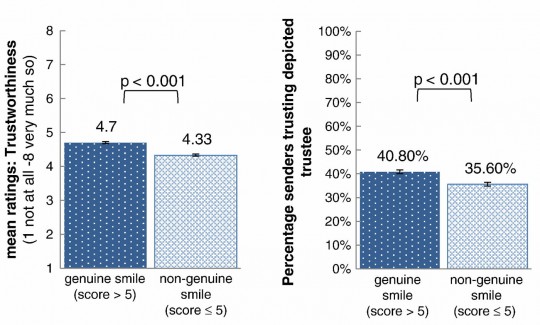One Small Thing That Makes You More Trustworthy, Attractive, and Intelligent

Building trust among others is something we all need to do, whether it’s among sales prospects, co-workers, potential business partners, or anyone else. Sometimes we have face-to-face contact, sometimes we use digital means, like live or recorded video. A recent study by French and German scientists shows there’s one simple thing we can do to increase our apparent trustworthiness. And, as a bonus, we’ll seem more attractive and intelligent, too.
What is that simple technique? You need to smile.
But, before you paste a grin on your face, you should know that not every smile is effective.
First, the setup… The researchers recorded videos of subjects participating in a trust game. In this common psychology experiment, two subjects send money back and forth, and the amount may be multiplied by the researcher. At a couple of points, the subjects can decide on the amount to send or simply to keep it all. In high trust conditions, the subjects will send more and potentially gain more.
in this experiment, the subjects introduced themselves with a short video of themselves. They knew they would profit if the other subject trusted them, so they were motivated to be persuasive in their video. All subjects used the same memorized text for their short video, so any differences were in the way they conveyed the identical message.
Social Smiles vs. True Smiles
One aspect of the experimental setup that Neuromarketing readers will find interesting is that the smiles of each subject were analyzed using a commerical facial analysis tool, FaceReader 5 from Noldus.
The objective of the analysis was to identify social smiles, which we consciously create by turning up the corners of our mouth, and true smiles.
True smiles are more involuntary and involve a variety of facial muscles, notably the zygomaticus major.
I find it interesting that while marketers debate the value of automated facial coding to gauge emotions, academics are applying it in their research.
Trust Me, I’m Smiling
The researchers found that true smiles increased trust compared to social smiles. The lift wasn’t huge, but it was significant.

Although the experiment was primarily aimed at evaluating trust effects, those subjects with real smiles were also judged to be more attractive and more intelligent, too.
One Small Thing That Makes You More Trustworthy, Attractive, & Intelligent pic.twitter.com/XbIn3rhf3c Share on XWork on Your Smile
While there’s debate among scientists as to whether an individual can artificially produce a “true” smile, it seems apparent to me that film actors do this all the time.
As you work on your trust smile, remember that it’s not just the mouth corner thing you do when you meet a stranger (or even someone you don’t like). Concentrate on involving your whole face.
And, take a lesson from the big screen actors who convincingly create a whole range of emotions. They don’t focus on specific muscle groups in their faces, but rather on experiencing the emotion they are supposed to convey.
So, when you are meeting someone in person or recording a video, think about something that really makes you smile and your true smile will shine through.
